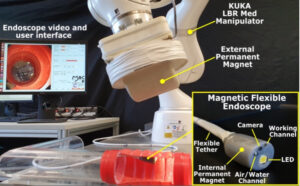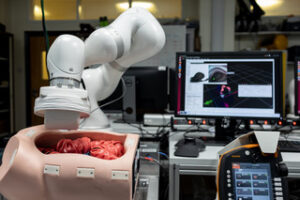VISE affiliates receive $1.2 million NIH grant to develop safer colonoscopy for IBD patients
A Vanderbilt research team has received a $1.2 million National Institutes of Health grant to continue developing a magnetic flexible endoscope for colonoscopies.
The robotic platform has the has the potential to provide a safer, more accessible, and potentially painless alternative to standard colonoscopy for patients with Inflammatory Bowel Disease (IBD).
Inflammatory bowel disease impacts the lives of more than three million people in the United States. It includes two conditions—Crohn’s disease and Ulcerative Colitis—that are characterized by chronic inflammation of the gastrointestinal tract. Prolonged inflammation results in damage to the GI tract. Patients with IBD, which is not the same as Irritable Bowel Syndrome (IBS), are at a much higher risk over their lifetime for post-colonoscopy complications compared to their non-IBD counterparts.
 The novel endoscope contains a video camera and permanent magnet at the end of a tether. The endoscope can explore the colon when a force is applied by an external permanent magnet attached to a robotic arm. The magnetic field generated, along with a localization
The novel endoscope contains a video camera and permanent magnet at the end of a tether. The endoscope can explore the colon when a force is applied by an external permanent magnet attached to a robotic arm. The magnetic field generated, along with a localization  algorithm, allows the system to know the position and orientation of the endoscope inside the body. Application of an autonomous control algorithm then allows the clinician to focus on finding, detecting, and treating lesions while the system performs the movements that the clinician desires.
algorithm, allows the system to know the position and orientation of the endoscope inside the body. Application of an autonomous control algorithm then allows the clinician to focus on finding, detecting, and treating lesions while the system performs the movements that the clinician desires.
The award is a continuation of a close VISE collaboration between Dr. Keith Obstein (Vanderbilt) and Drs. Pietro Valdastri and Evangelos Mazomenos (Leeds, UK); where Drs. Obstein and Valdastri run the Science and Technology of Robotics in Medicine (STORM) Lab USA and UK, respectively.
“We sincerely appreciate NIH-NIBIB and VISE support, as this will allow us to bring the technology one step closer to patients,” Obstein said.
“Many of the relationships that Dr. Obstein and I have cultivated with our partners is thanks to VISE’s spirit of innovation and collaboration,” Valdastri added.
The team has proposed the first in-human studies of their magnetically actuated robotic platform for colonoscopy and the first in-human demonstration of intelligent control with assistive autonomy using magnetic fields.
